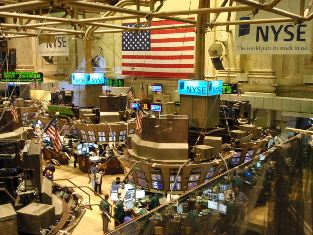 A stronger jobs report wasn't enough to calm financial markets or stem concerns that the U.S. might be sliding into another recession.
A stronger jobs report wasn't enough to calm financial markets or stem concerns that the U.S. might be sliding into another recession.
The Dow Jones industrial average was down nearly 130 points in midday trading Friday.
Investors are increasingly concerned about the economy in the U.S. and abroad. Among the issues: The building financial crisis in Europe; hiring in the U.S. that is too slow to significantly lower the unemployment rate; anemic growth in manufacturing, the service sector and a decline in consumer spending; and the belief that the government has might not do more to stimulate the economy.
European leaders have interrupted their summer vacations for emergency meetings. They are trying to craft a plan that would prevent Italy or Spain from becoming the latest countries in the region to require large-scale financial help.
The two countries have Europe's third and fourth largest economies. But European leaders and central bankers might not have the cash needed to prop them up until a larger financial rescue fund can be established by a broader group of financial leaders.
The U.S. economy added 117,000 jobs in July, and hiring in May and June were not as bad as reported previously, the Labor Department reported. The unemployment rate inched down to 9.1 percent from 9.2 percent, partly because some unemployed workers stopped looking for work. Health care providers and manufacturers added jobs.
The Dow had jumped as many as 171 points when the market opened for trading because of the jobs news. By midmorning it was down more than 100 points.
Fears about the broader economy are outweighing the improved jobs report and strong corporate earnings, said Dan Greenhaus, chief global strategist at the trading firm BTIG.
"From an economic standpoint, 117,000 jobs is hardly sufficient to boost the economy," he said. He said it is impossible to tell how long the nervousness will affect the market, but he said it will more likely be years than months.
About twice as many jobs as that must be created every month in order to rapidly reduce the unemployment rate. It has been above 9 percent nearly every month since the recession officially ended in June 2009. Many economists fear that the economy might dip back into recession.
Shortly after noon, the Dow Jones industrial average fell 126, or 1.1 percent, to 11,258. The Standard & Poor's 500 index dropped 19, or 1.6 percent, to 1,181. The Nasdaq composite index plunged 63 points, or 2.5 percent, to 2,493.
The Dow Jones industrial average plunged 513 points on Thursday. It was the worst day for the Dow since 2008. It is now down 1,500 points, or 11.8 percent, the losing streak began on July 21. The S&P 500 is down 12.5 percent since July 22. All three indexes are in correction. That happens when an index loses more than 10 percent off its recent highs.
Overseas markets also fell. Tokyo, Hong Kong and China all closed down 4 percent. Taiwan lost 6 percent. In Europe, shares recovered some of their losses after plunging to their lowest levels in more than a year. Germany's DAX index fell 2.8 percent. Other indexes showed smaller losses.
The Vix, a measure of investor fear, is up 135.5 percent since July 1.
Economic fears pushed benchmark West Texas Intermediate crude for September delivery down by 64 cents on Friday to $85.98 per barrel on the New York Mercantile Exchange. On Thursday, crude tumbled $5.30 to $86.63.
The yield on the 2-year Treasury note fell to 0.29 percent, after brushing a record low of 0.26 percent earlier Friday. Frightened investors are buying bonds, sending their prices higher and yields lower. The yield on the benchmark 10-year Treasury note rose to 2.48 percent after hitting a low since last year of 2.34 percent.
Traders have focused on a torrent of bad economic news since the U.S. government struck a deal last weekend to raise the nation's borrowing limit, averting a debt default. Manufacturing and the service sector are barely growing. The economy expanded in the first half of the year at its slowest pace since the recession ended in June 2009.
Economists at Wells Fargo Securities estimate there is a one in three chance of another U.S. recession.
Only three of the three S&P 500's ten industry groups are up for the year: Health care, utilities and consumer staples. Traders consider those companies to be relatively recession-resistant.
Procter & Gamble's stock opened higher but was flat in late morning trading. The consumer products company's fourth-quarter revenue and income jumped on strong sales in emerging markets.
Viacom Inc. fell slightly after the firm said its income and revenue increased more than analysts expected in the second quarter because of strong advertising sales and fees from cable companies.
Priceline.com Inc. surged 8 percent, the most in the S&P, after the company reported that it earned far more than expected in the second quarter as travel bookings on the website increased.
----
AP Energy Writer Jonathan Fahey in New York contributed to this report.
© 2011 The Associated Press. All rights reserved. This material may not be published, broadcast, rewritten or redistributed. Learn more about our Privacy Policy and Terms of Use.
- Home
- News
- Opinion
- Entertainment
- Classified
- About Us
 MLK Breakfast
MLK Breakfast- Community
- Foundation
- Obituaries
- Donate
11-18-2024 1:26 pm • PDX and SEA Weather












































































































































































































































































































